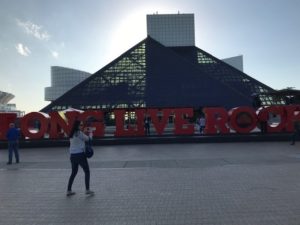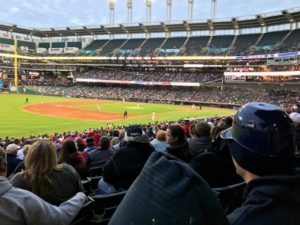The Major League Baseball team long known as the Cleveland Indians will rename itself at the end of this season as the Cleveland Guardians. The change will surely draw criticism from traditionalists, but it is long overdue. The logo is outrageously racist and derogatory. The name could conceivably be neutral in intent if it honored Native Americans, but the logo has always belied any supposed good intentions. Conservative fans in Ohio long defended the name and the logo, but time is up, and it is just as well. The image has worn out its welcome.
In my college days at Cleveland State University, I recall the American Indian Movement challenging reenactments of Cleveland founder Moses Cleaveland landing on the shores of the Cuyahoga River in 1796. A few years later, a friend of mine, Legal Aid lawyer Joseph Meissner, was suing on behalf of American Indian clients who claimed the name and logo were racist in intent. The lawsuit was undoubtedly ahead of its time, but Joe had a way of making a point. One day, he had a variety of posterboards in his office, done by a local artist, depicting various minorities in the same manner as Chief Wahoo, with names like the “Cleveland Negroes” and “Cleveland Italians,” among others I no longer recall. His point was that, if these other logos seemed offensive (and believe me, they were), then why was it any more tolerable to accept the Chief Wahoo logo for the Cleveland Indians? To this day, there has never been a good answer for that question.
But I know many Cleveland fans will be annoyed or angry. For years, relatives of mine argued with me in defense of the team when I said it was a matter of time before they would have to confront the reality of what the name and logo represented and accept change. I am not picking on them by saying that. Their reactions were quite typical, and part of that was a natural defensiveness about a city that had suffered depopulation, industrial decline, job losses, and the embarrassments of past mayors Ralph Perk and Dennis Kucinich in the 1970s. For my part, I moved to Iowa in January 1979, so I guess I was a turncoat in the eyes of some, but lots of people find new paths in life. It’s just that in Cleveland, every departure felt like another blow to the city’s pride.
Gradually, the city adjusted to its setbacks of that era, grew a large medical services industry, bult a new stadium for its baseball team, replacing the cavernous Municipal Stadium (where a new Cleveland Browns stadium now sits on the lakefront), and cleaned up its once badly polluted river. Cleveland State and other universities grew to serve the city and the region. The Cuyahoga Valley became the site of a national park. As an urban planner, I might add that there is some good planning happening in the region. Although the Cleveland Indians lost the World Series in the tenth inning of the seventh game in 2016 to the Chicago Cubs, the Cleveland Cavaliers, with the incredible efforts of LeBron James, won the NBA title over the Golden State Warriors. So, there’s all that.

Cleveland’s Rock n Roll Museum on the Lake Erie waterfront, one of the city’s huge tourism attractions
In a brilliant way, the new name, Guardians, is a perfect fit for this mindset. It allows this defensive posture regarding a historically great American city to become a positive virtue, as protectors of its civic virtue and community reputation. Clinging to the moniker of Indians, especially with Chief Wahoo as a mascot, could never do that. It would merely ensure the need to defend a highly questionable tradition. Instead, fans can shift their attention to protecting and promoting the city’s future.
But back to the name change. Long ago, when I was in Iowa City as a graduate student, Pastor Roy Wingate of Gloria Dei Lutheran Church once commented in a small group conversation over lunch that, “Much prophecy is little more than knowing that water flows downhill,” which is to say that prophets often are simply observing what others refuse to see. (In a more literal sense, this point was not lost on me later as a planner involved in disaster recovery and hazard mitigation talking to people about floods.)
My occasional debates with Cleveland friends and relatives about the eventual demise of the Cleveland Indians logo was little more than Rev. Wingate’s observation about prophecy. Water flows downhill. Changing a racist logo was just a matter of time, and finally, the ownership of the team has recognized that the waters of justice have overflown the utility of calling a team the “Cleveland Indians.”
It was never if, but when. The time has come.
Jim Schwab


